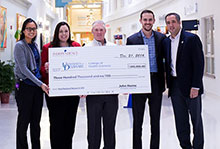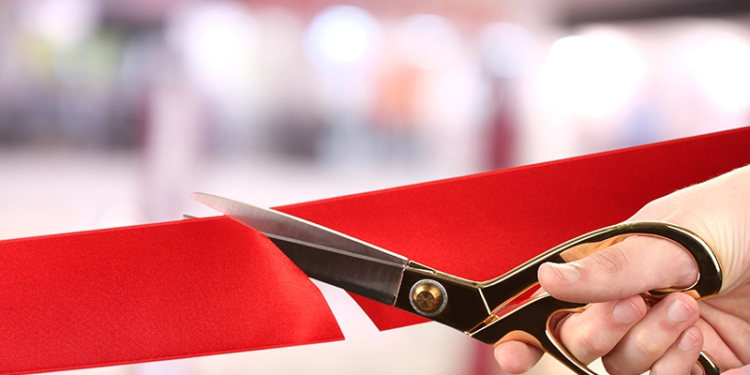
From left, Jocelyn Wong Neill of Independence PO, Sions, Horne, Michael Smith of the College of Health Sciences, and Dan Sarkissian of University Development. Photograph courtesy of Dante LaPenta and UDel.
John Horne, CPO, CPed, president of Independence Prosthetics-Orthotics, with offices in Delaware and Pennsylvania, has donated $300,000 to create a post-doctoral research fund in the University of Delaware’s (UDel’s) College of Health Sciences. The donation is structured for a six-year duration. Under the direction of Assistant Professor Jaclyn “Megan” Sions, PhD, PT, DPT, OCS, CEEAA, the fund will provide support for post-doctoral researchers who will work on outcomes-related O&P research by assisting with the analysis and publication of patient evaluations that Sions and Horne have been collecting for over three years.
In 2012, Horne approached UDel’s Department of Physical Therapy with a proposal to establish a multidisciplinary clinic for patients with amputations in order to improve the documentation process. Sions and a colleague developed prosthetic evaluations to document medical necessity for insurance purposes. Sions and Horne, who have since modified the original prosthetics evaluation based on emerging prosthetics research, began working together clinically in September 2013. They also began attending national O&P conferences together, which helped them determine the need for clinical prosthetics research. Since the effort began, they have accumulated data on over 140 patients with lower-limb amputations and used it to answer research questions such as, “How do you determine what the best prosthetic device is for a given person?”
Horne said he hopes the support will culminate in advances related to post-amputation clinical care and improve outcomes for this patient population. “Understanding factors which limit patient progress is an important aspect of clinical research that needs more attention,” Horne said. “If we are able to identify specific issues that hinder an individual’s ability to optimize their prosthetic to their full potential, then we will have made great strides in our industry.” Examples include identifying varying factors such as a poor prosthetic socket fit and comfort, lack of patient confidence with using their devices, and mental health issues and other comorbidities that may affect the individual’s best outcome. If the research team can determine how these influences affect the outcomes, then they may propose interventions to improve the quality of function and life for the patient.
Horne opened an Independence PO location in late 2015 on UDel’s Science, Technology and Advanced Research (STAR) Campus. The funding is said to be the first-of-its-kind and allows a prosthetist an opportunity to train in STAR Health clinics and learn from physical therapy researchers.
Editor’s note: This story was adapted from materials provided by Dante LaPenta and UDel.




